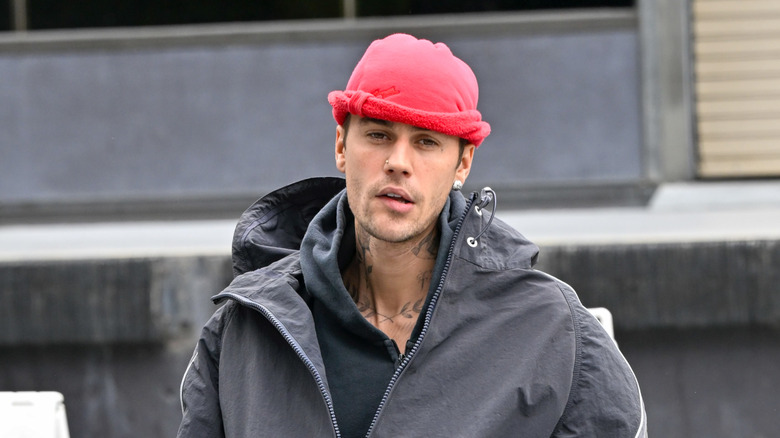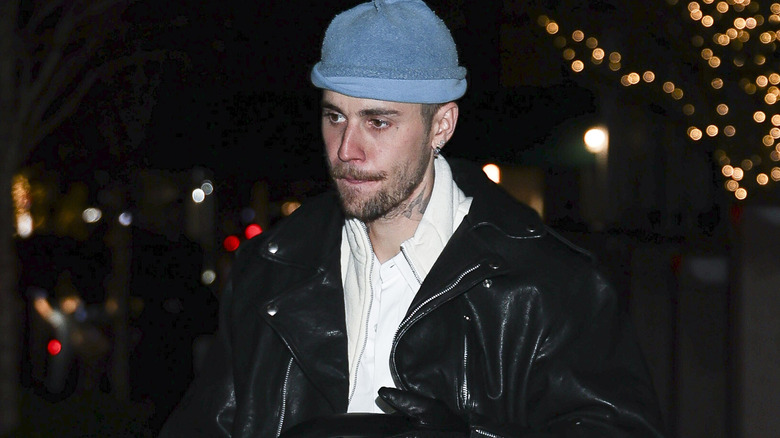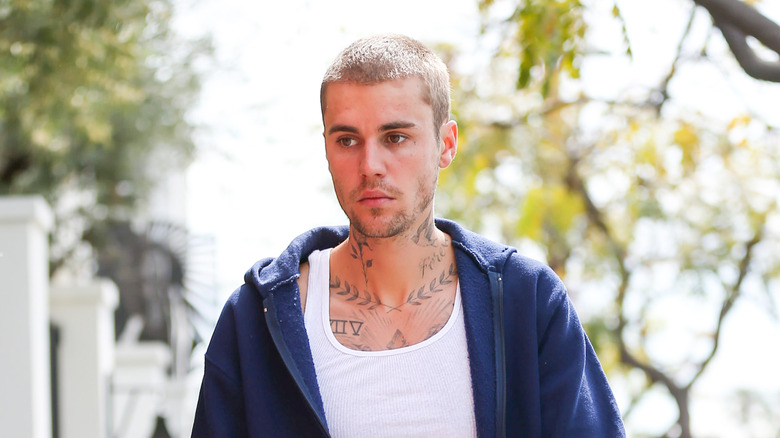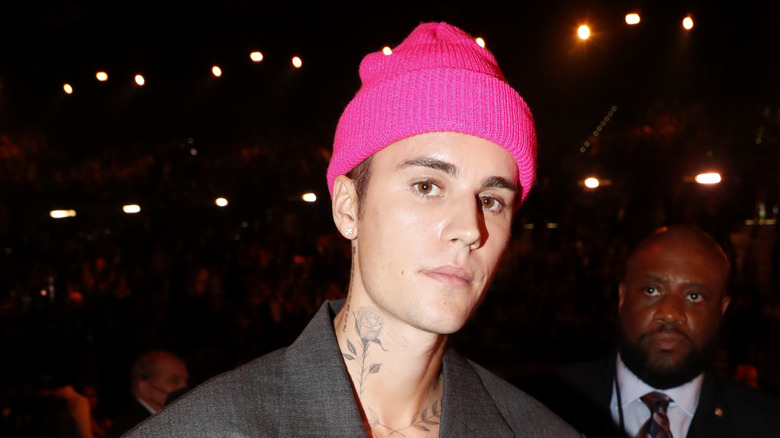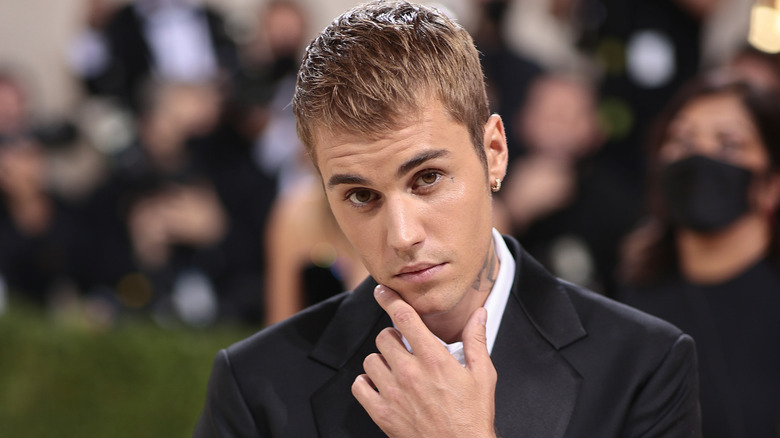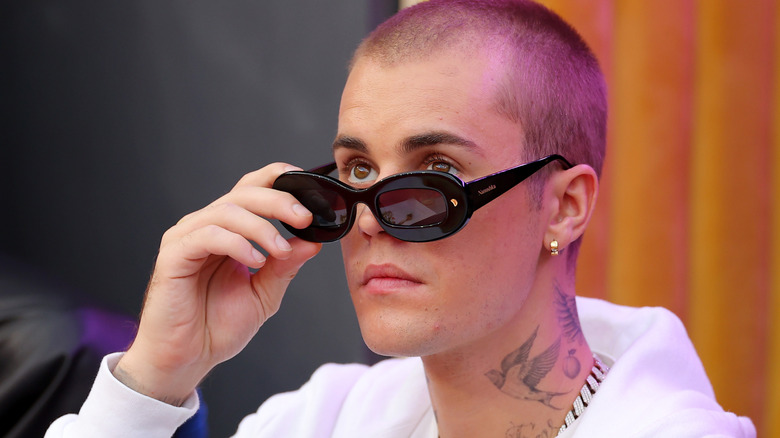All Of Justin Bieber's Health Problems Explained
This article include mentions of substance abuse and mental health disorders.
Fans have been concerned about Justin Bieber on multiple occasions, and oftentimes, these concerns were warranted. Word on the street is that Bieber is dealing with some major money problems as of this publication, and photographs of the singer that surfaced in February 2025 sparked concerns about his health. Bieber looked worse for wear and, quite frankly, disheveled, when paparazzi managed to snap some photographs of him on the street. Red-eyed and gaunt, the singer's appearance had fans worried that he might have fallen back into old habits of substance abuse. But one should take into account that Bieber is a new father, and most babies don't exactly let you sleep through the night. But then there was a TikTok video of Bieber interacting with a fan, and many found his behavior odd, speculating that the singer was high during the encounter.
Bieber's rep tried to nip the rumors in the bud, telling TMZ that the singer is perfectly fine, calling the gossip, "exhausting and pitiful and [it] shows that despite the obvious truth, people are committed to keeping negative, salacious, harmful narratives alive." They added that Bieber is pulling all-nighters working on a new album and taking care of his baby son. In March 2025, Bieber took to his Instagram Stories to share a perplexing post that only added to fans' worry, writing, "We have nothing to prove today. Just the gift of life today to accept and [receive]. Nothing is owed to us and we [don't] owe anyone anything" (via People).
Meanwhile, doctors (none of whom have actually treated Bieber) told the Daily Mail that the singer looked in dire need of some R&R. Naturally, this hasn't done anything to quell fans' worries, and indeed, Bieber has dealt with a myriad of health issues over the years.
He's struggled with substance abuse
Among the myriad of rumors about Justin Bieber we can't ignore, the scuttlebutt about his possible substance abuse is the most concerning. Justin has previously opened up about the scary details of his past drug abuse. While discussing his relationship with his wife, Hailey Bieber, with Vogue in 2019, Justin admitted, "I'm the emotionally unstable one [in the relationship]. I struggle with finding peace. I just feel like I care so much and I want things to be so good and I want people to like me." He added that his wife is the exact opposite.
During some of the most turbulent years of his life (fans will remember those vividly), Justin was addicted to Xanax, something that happened, in part, because he was trying to numb feelings he didn't want to deal with. "I found myself doing things that I was so ashamed of, being super-promiscuous and stuff, and I think I used Xanax because I was so ashamed," Justin told Vogue. "Drugs put a screen between me and what I was doing. It got pretty dark. I think there were times when my security was coming in late at night to check my pulse and see if I was still breathing."
Bieber addressed his past addiction in his docuseries, "Justin Bieber: Seasons," admitting that he started experimenting with marijuana when he was around 12 or 13 years old. Soon, he reached for other drugs. As he continued down this dark path, he eventually realized that it wasn't going anywhere good. "People don't know how serious it got," he said in the docuseries. "It was legit crazy scary." In the end, he got the help he needed to get clean, but it took a few tries and getting to the root of his issues.
If you or anyone you know needs help with addiction issues, help is available. Visit the Substance Abuse and Mental Health Services Administration website or contact SAMHSA's National Helpline at 1-800-662-HELP (4357).
Justin Bieber was diagnosed with Lyme disease
In January 2020, Justin Bieber took to his Instagram page to share that he'd been diagnosed with Lyme disease and had been suffering from symptoms for years before his diagnosis. Before this announcement, rumors ran rampant that Bieber had once again started abusing drugs because he'd looked unwell in paparazzi snaps. Bieber addressed this in the post, saying that, while the public was making these assumptions, he was going through a health crisis.
In his docuseries, "Justin Bieber: Seasons," the singer opened up about the process that finally led to his diagnosis. He explained how he suffered from unexplained fatigue and had to undergo numerous tests to confirm the diagnosis. "It's very hard for doctors to test for it," Bieber explained. He was initially misdiagnosed with bipolar disorder, but the psychiatrist in question failed to do due diligence and never ordered a brain scan to confirm the diagnosis. When another doctor did this, they found that Bieber didn't have the mental health condition, and that's when they started looking at other possible diagnoses.
Lyme disease is a bacterial infection carried by black-legged ticks, commonly referred to as deer ticks. When you get bitten by an infected tick, the disease gets transferred to your body. If not treated promptly, it can lead to severe symptoms, affecting the nervous system, heart, joints, and skin, according to Cleveland Clinic. Even though Lyme disease can be treated with antibiotics, it can leave infected individuals with long-term side effects. Bieber was determined to beat the disease and take better care of his health. "I'm committed to getting better and committed to doing whatever I have to do, whether it's inconvenient or not," Bieber said in his docuseries.
He had chronic mono
Aside from being diagnosed with Lyme disease in 2020, Justin Bieber's doctors also discovered that he had a chronic case of mono. His wife, Hailey Bieber, attested to how sick Justin was during the whole ordeal in "Justin Bieber: Seasons," saying the hardest part was not knowing the cause of his symptoms. In a since-deleted Instagram post, Justin took a swipe at critics who surmised he was doing drugs again. "[I] had a serious case of chronic mono which affected my, skin, brain function, energy, and overall health," he wrote (via USA Today).
The Epstein-Barr virus, which causes mono, is as common as it is contagious. In very rare cases, the virus can even cause cancer. Cleveland Clinic notes that, oftentimes, individuals who have the Epstein-Barr virus don't present with any symptoms, but they can easily infect those around them since the virus is spread through bodily fluids, like saliva. Once you contract it, you can't get rid of it. The virus stays dormant in the body and can reactivate at any time, especially when an individual is dealing with a weakened immune system or stress.
The reason Justin went undiagnosed for a long time is because mono isn't that easy to diagnose, since it shares symptoms with so many other diseases. A blood test can usually help detect the antibodies causing the virus, but they are often undetectable in the early stages of the disease. There's also no cure — doctors opt to treat the symptoms of the virus, which usually includes taking medicine to help with pain and fever. Patients are advised to rest and drink enough water while ill. Symptoms can last for two to four weeks, but some people can continue to experience fatigue months after all other symptoms have disappeared.
Justin Bieber was diagnosed with Ramsay Hunt syndrome
In June 2022, Justin Bieber took to Instagram to share a very personal update with his fans. After he canceled his world tour, he went quiet, and fans were wondering what really happened to Bieber. As it turned out, the singer had been diagnosed with Ramsay Hunt syndrome, an illness that affects the facial nerve, causing partial facial paralysis. "As you can see, this eye is not blinking," Bieber said in the video he posted to social media. "I can't smile on this side of my face. This nostril will not move. So there's full paralysis on this side of my face."
Cleveland Clinic notes that a virus called varicella-zoster is responsible for Ramsay Hunt syndrome. This is the same virus that causes common illnesses like shingles and chickenpox. Someone who's had either one of these illnesses before is more likely to get Ramsay Hunt syndrome, since the virus can remain dormant after they heal from the initial disease. For reasons still unknown, the virus can, when reactivated, cause paralysis of the facial nerve. Immunocompromised individuals can get very sick if they develop Ramsay Hunt syndrome, and the recovery time is different for each person. With adequate treatment, some improve in a few weeks. Others can take months or even a year to finally recover. In a small percentage of cases, the paralysis can become permanent. Unfortunately for Bieber, a quick recovery wasn't in the cards.
He only shared an update on the disease in March 2023, taking to his Instagram Stories to happily announce that the paralysis had gone completely. He captioned the short video, "Wait for it," per People, and showed off his ability to move both his eyes before dazzling fans with a full smile.
The singer has dealt with depression
Justin Bieber has undergone a stunning transformation over the years, but all the fame and fortune took its toll on the singer's mental health. In September 2019, Bieber posted a lengthy essay to his Instagram account in which he spoke candidly about his mental health issues and how they originated.
Bieber admitted to going through a very dark period where misery was his constant companion and he contemplated whether life was still worth living. The reason he ended up in such a dark place, Bieber wrote, is because of the fame he experienced as a young child, explaining that it left him unable to navigate the real world. He was living in a bubble where everyone constantly told him how amazing he was. "You hear these things enough as a young boy and you actually start believing it," Bieber wrote. "Everyone did everything for me, so I never even learned the fundamentals of responsibility." When he was finally forced to deal with real life as an adult, he failed miserably. Bieber dealt with depression, admitting in "Justin Bieber: Seasons" that something as simple as getting up in the mornings sometimes felt impossible.
Bieber's Lyme disease can also impact his mental health, Dr. John Aucott, director of the Johns Hopkins Lyme Disease Research Center, told Healthline. While Lyme disease doesn't often lead to severe depression, Aucott says it can cause mild symptoms. A 2018 study published by Science Direct found that it's possible for 8%-45% of Lyme disease patients to experience symptoms of depression even after they've been treated.
He has admitted to struggling with impostor syndrome
Aside from depression, Justin Bieber has also admitted to dealing with impostor syndrome. He did so with a cryptic message on his Instagram Stories in March 2025, writing, "People told me my whole life, 'Wow Justin you deserve that.' And I personally have always felt unworthy. Like I was a fraud. Like when people told me I deserve something. It made me feel sneaky like, damn if they only knew my thoughts, how judgmental I am, how selfish I really am, they wouldn't be saying this" (via Cosmopolitan). He ended his message with, "I definitely feel unequipped and unqualified most days."
WebMD notes that impostor syndrome is not classified as a mental health disorder, but that it does cause very real symptoms, most notably feelings of inadequacy, making people feel like they don't deserve the things they've accomplished. It can also make you doubt your abilities and whether your contributions and work matter. You think everyone can do things better than you, and when you do accomplish something, you don't allow yourself to savor your success, instead worrying about what's next. This does sound in line with what Bieber described, and studies have found that it's a common phenomenon, with 82% of people experiencing these kinds of feelings and thoughts at some point in their lives.
Talk therapy comes highly recommended for those who deal with impostor syndrome as well as cognitive processing therapy, which helps individuals rewire their brain to turn negative thoughts and beliefs into positive ones. Group therapy, which includes talking with others experiencing the same symptoms can also be beneficial.
If you or someone you know needs help with mental health, please contact the Crisis Text Line by texting HOME to 741741, call the National Alliance on Mental Illness helpline at 1-800-950-NAMI (6264), or visit the National Institute of Mental Health website.
